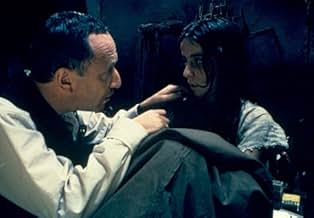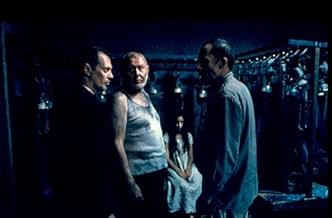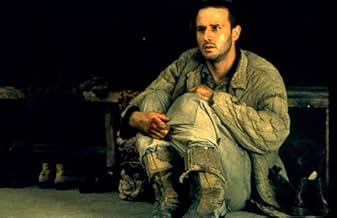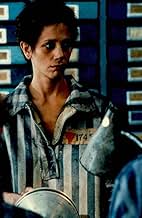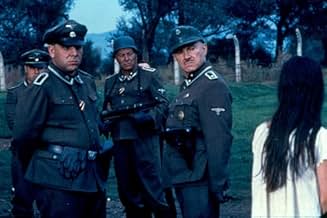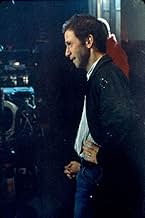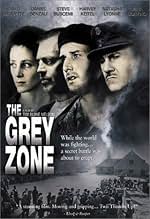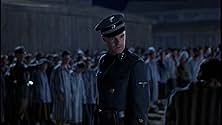A Nazi doctor, along with the Sonderkommando, Jews who are forced to work in the crematoria of Auschwitz against their fellow Jews, find themselves in a moral gray zone.A Nazi doctor, along with the Sonderkommando, Jews who are forced to work in the crematoria of Auschwitz against their fellow Jews, find themselves in a moral gray zone.A Nazi doctor, along with the Sonderkommando, Jews who are forced to work in the crematoria of Auschwitz against their fellow Jews, find themselves in a moral gray zone.
- Awards
- 1 win & 3 nominations total
- Lowy
- (as Georgy Zlatarev)
- Anja
- (as Lisa Benavides)
- Woman Inmate
- (as Dafina Katzarrska)
Featured reviews
An unthinkable,unconscionable deal has been worked out between a certain group of Nazi death camp inmates and their captors: in order to avoid the ovens(in all likelihood,only temporarily),these inmates would use their talents(among them,musical) to placate and ease along the funneling of other Jews and "undesirables" into the death chambers. A strong cast and an even stronger screenplay/script is augmented by very intelligent cinematography. Particularly good turns by David Arquette,Steve Buscemi,Daniel Benzali and Mira Sorvino as the inmates,all desperate,all convinced of what they have to do to survive and in Arquette's character's case,not even certain if it is even worth it.
It would be tempting to slam "Schindler's List" after seeing this,but I won't. SL is meant as an epic,a tribute,a story of the upside of surviving through the most dense of human tragedy,whereas GZ is a decidedly darker exploration of what happens to people in the same situation but are pushed into much less noble,much more selfish and desperate devices. Both are strong examples of the genre,but where GZ triumphs is that that it explores the most damning actions through the consciences of people faced with decisions that nobody should have to make. It is an unflinching portrait of a dark chapter in human history,rife with detail and completely lacking of lecturing. THis film is for anyone who wants to see an unvarnished and stark portrayal of the human condition brought to its lowest denominator. A must-see for college classrooms and Holocaust museums anywhere!
After having read Eyewitness Auschwitz, written by a member of the Sonderkommando, and "Auschwitz: A Doctor's Eyewitness Account" by the completely self-absorbed doctor (in reality, not the movie) upon which this film is based, I'm glad this project was undertaken. It is a well-made movie that tries to portray too many of the complicated issues that involved with the subject. It has received some harsh criticism, especially by some who claim to be interested in the subject, but obviously missed many points in the movie. Since I don't know of any other films about the revolt of the twelfth Sonderkommando of Birkenau, I think this one is very good.
One final note: Some people seem to think that the title refers to some moral dilemma faced by the characters. While that certainly was an issue for some who were there, and while the movie title may convey a double meaning, the main reason Birkenau was referred to as the Grey Zone was due to the coating of ash from burned human corpses that covered everything, including those who lived and worked there. It was on the ground, on the buildings, and on their clothing. They literally ate and breathed it 24 hours a day.
horrifying spectacle I vowed to never see it again. It is absolutely
among the most graphic, violent films ever made, save slasher/horror films. I saw it again to see what was buried
underneath the gore. It was surprising. As a historical document
alone The Grey Zone is unique and impressive. Countless small
details contribute to its originality: the blue-green color of the
Zyklon B crystals, the sprinklers constantly working the lawn
beside the crematoria, the clear, pretty daylight when the trains
arrive, the intimate building-to-building geography of Birkenau --
only the film Shoah manages to make these small historical
details count so much. What's left to be said about the Holocaust?
These things. Small things. Details. The grass, the sound ovens
make, sunlight hitting brick. Shoes. Luggage.
The Grey Zone is so unique that it has been misinterpreted. There
is virtually no music, nothing to tell you how to feel. It is exactly the
opposite of melodrama. The mundane repetition of the killings
actually numbs you after awhile, and this is intentional since this is
how the main characters are affected. There is no uplifting
message, and no cliched Zionist coda like Schindler's List
suggesting that all the suffering had a destination and a design.
There are some awkward elements in the film. But these are
minor next to the clarity of purpose and originality. The Grey Zone
should not become marginalized in the canon of Holocaust art
because it refuses to be sentimental. Hopefully it will be
referenced and reviewed for a long time.
Did you know
- TriviaWriter and Director Tim Blake Nelson made Dr. Miklos Nyiszli's memoirs "Auschwitz: A Doctor's Eyewitness Account" (1946) mandatory reading for the film's cast, along with Primo Levi's "The Drowned and the Saved" (1986) and Filip Müller's "Eyewitness Auschwitz" (1979).
- GoofsAfter the men set the crematoria 4 on fire they tore down the fences and fled into the woods. They barricaded themselves in a barn where SS caught them. They were burned alive inside the barn.
- Quotes
Hoffman: I used to think so much of myself... What I'd make of my life. We can't know what we're capable of, any of us. How can you know what you'd do to stay alive, until you're really asked? I know this now. For most of us, the answer... is anything. It's so easy to forget who we were before... who we'll never be again. There was this old man, he pushed the carts, and on our first day, when we had to burn our own convoy, his wife was brought up on the elevator. Then his daughter... and then both his grandchildren. I knew him. We were neighbors. And in 20 minutes, his whole family, and all its future, was gone from this earth. Two weeks later, he took pills and was revived. We smothered him with his own pillow, and now I know why. You can kill yourself. That's the only choice. I want them to save you. I want them to save you more than I want anything. I pray to God we save you.
- ConnectionsFeatured in WatchMojo: Top 10 Holocaust Films (2014)
- SoundtracksRoses from the South Op. 388
(1880)
Composed by Johann Strauss (as Johann Strauss)
Orchestrated and arranged by Jeff Danna and Andrew Lockington
Performed and conducted by members of the Bulgarian Symphony Orchestra
Details
- Release date
- Country of origin
- Official site
- Languages
- Also known as
- Gri Bölge
- Filming locations
- Production companies
- See more company credits at IMDbPro
Box office
- Budget
- $5,000,000 (estimated)
- Gross US & Canada
- $517,872
- Opening weekend US & Canada
- $24,526
- Oct 20, 2002
- Gross worldwide
- $621,592
- Runtime
- 1h 48m(108 min)
- Color
- Sound mix
- Aspect ratio
- 1.85 : 1


